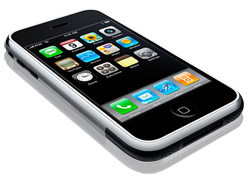U.S. Will Never Become a Mobile-Centric Culture, Argues Third Screen Media Founder Tom Burgess

Americans traveling to the Olympics in Beijing and Hong Kong have been struck by the sophistication of Asia's mobile devices. While the Asian mobile market is technologically years ahead of the United States, the cause is likely more cultural differentiation than just a lag in U.S. technology. Tom Burgess, founder and CEO of Third Screen Media, (acquired last year by AOLPlatform-A), suggests culture is also the driving force behind the convergence of mobile devices with other media. In an exclusive interview with JackMyers Media Business Report, Burgess argues that although Apple's iPhone has dramatically changed the American mobile market, it is unlikely the U.S. will ever become a truly mobile-centric culture.
"The Korean and Japanese markets and some of the European markets are, at least culturally, more advanced" said Burgess. "They are using their mobile devices to access digital media more than in the U.S. In Japan, the distribution of mobile phones far outweighs the distribution of home-based PCs. The mobile device is the primary data access or digital access device for those cultures. So those cultures tend to be more advanced as far as eyeballs using their phones."
India is a particularly thriving market with 10 million new mobile phones activated every month, according to Burgess. While Asian and European countries seem to be making the most technological progress, the development of mobile advertising largely remains within the United States.
When asked if he thought American culture would ever become as mobile-centric as others, Burgess was hesitant to make a prediction but did emphasize the revolution caused by Apple's iPhone, citing a statistic he recently heard that 75 percent of all interactions on an iPhone are digital media access and a mere 25 percent are actual phone calls. Despite the iPhone phenomenon, it is unlikely the iPhone will completely take over the market.
"I don't think everyone's going to have an iPhone" he said. "What I do think is everybody is going to have an iPhone-like device because the carriers are not ones to lie down and let another carrier get an exclusive. They will come out with other devices." Sprint's Samsung Instinct and Verizon's LG Dare are examples. Both feature touch-screen technology, GPS navigation, a digital camera and a striking aesthetic resemblance to the iPhone.
Though interactions on iPhones and iPhone-like devices in the U.S. skew away from actual talk time and more towards messaging, video and web access, Americans will continue to use a computer as the primary access point for digital media, despite improvements in mobile technology. Burgess notes many American households contain at least one working computer for every household member. In Japan, Korea, India, China and even some European countries such as the Netherlands, families think of the mobile phone as opposed to the computer as the primary digital media access point. This is not to say the global mobile industry is headed towards convergence either.
"Convergence is driven by culture" says Burgess. "The reason people talk about convergence all the time is because the technology business and the media business are looking for a more efficient model. I don't think technologists and the media industry can 100 percent shape what the culture is going to do. The culture really ends up shaping itself. With influencers from other countries influencing each other, you're going to find people have different behaviors and different interests. I don't think convergence of devices or convergence of media access is ever going to come down to one device."
Burgess points out the current tendency to simultaneously carry several devices - Blackberry, mobile phone and laptop - because of the various purposes each serves as well as the variety of screen sizes. While mobile devices may converge into iPhone-like devices, it's likely Americans will always have a home-based device. Until mobile phones feature 13 inch fold-out screens, increased memory and a prolonged battery life, I expect the preferred method for viewing video and digital content in the United States will remain the television or computer.


